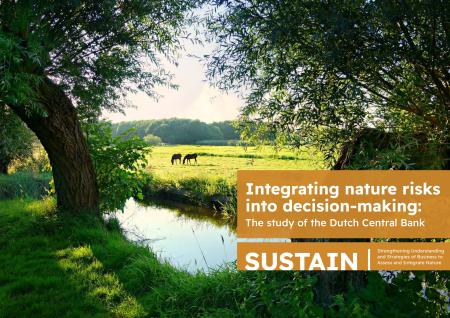
Resource description:
The degradation of our natural world poses a threat to our economies and ambitions for human wellbeing currently expressed through the UN Sustainable Development Goals. Ecosystems, species and the services they provide are significantly threatened by economic activities, yet simultaneously are heavily relied upon for providing nearly all goods and services. To achieve the goals set out in the Kunming-Montréal Global Biodiversity Framework, the whole society and particularly business and finance must reconsider their ways of operating to halt and reverse their negative effects on nature and contribute to planetary wellbeing.
Central banks and supervisors have a responsibility – or mandate – to ensure financial stability and scan for risks across long term horizons. If a systemic risk is identified, they influence national policies by advising governments and setting relevant supervisory policies for the financial sector. They also indirectly influence the business sector by ensuring that financial institutions manage the risks in their investments, loans and insurance. Central banks and supervisors play an important role in achieving a nature-positive economy through their policies, long- term risk focus and research and the guidance they provide to governments and financial institutions to manage nature risks.
The Dutch Central Bank (DNB) has shown leading practice as a financial institution and a regulator through its integration of nature3 into policies and decision-making. DNB’s research into nature-related risks has identified that nature risks are financial risks: nature loss can affect the stability of financial institutions, companies, and the economy at large. The bank’s research also revealed that Dutch financial institutions are exposed to nature risks through the finance they provide via loans, investments, and insurance. Nature risks could affect financial stability, and therefore fall within the Dutch Central Bank’s mandate. Under its Sustainable Finance Strategy, DNB is taking action to integrate sustainability risks, including nature, into all its core functions and engages with others, including legislators, to contribute to the management of nature-related risks for the economy and financial systems.
DNB’s work also reflects an understanding that climate and nature are interlinked: to design actions and strategies that benefit nature and add to overall resilience of financial institutions and companies, an integrated climate-nature approach is needed. DNB’s leadership in this area comes at a critical time when all financial institutions must address their role in the nature and biodiversity loss crisis. To transition to nature-positive economy, credible and impactful actions on nature need to be taken by multiple actors. As a first step and to comply with Global Biodiversity Framework’s targets, institutions must assess how their operations impact and depend on nature to determine their exposure to nature-related risks and opportunities.4 The assessment should inform subsequent steps to adopt relevant targets and commitments, take transformative actions, and disclose relevant information to key stakeholders.
This study aims to showcase the work of DNB on nature and in the process help readers understand why and how nature loss should be addressed by societal actors, particularly financial institutions and businesses. The study will signpost relevant resources and draw out some of the lessons learned through the work DNB is doing to incorporate nature into its institutional policies and operations.
The study is structured as follows:
- An introduction to the importance of nature, current regulatory and legal landscape, and a potential course of action through the high-level actions on nature through the Assess, Commit, Transform and Disclose (ACT-D) steps.
- A presentation of DNB’s body of work on nature including its strategy to incorporate sustainability5 into all core functions.
- DNB’s approach to assessing exposure of the Dutch financial sector to nature risks.
- The bank’s latest work on scenarios, stability, and analysis of its own investments.
- DNB’s influence through its network and community building work.
- A summary of high-level recommendations on how to effectively embed nature into strategies and operations and final thoughts.
Author/Contact:
Lead author:
Lenka Moore, Capitals Coalition
Contributing authors:
Eve Gleeson, ShareAction
Martin Lok, Capitals Coalition
Additional information:
The SUSTAIN project is funded by European Union’s Horizon Europe research and innovation program under grant agreement No 101060320, the Swiss State Secretariat for Education, Research and Innovation (SERI), and UK Research and Innovation (UKRI) under the UK government’s Horizon Europe funding guarantee 10075763, 10038461 and 10046192.